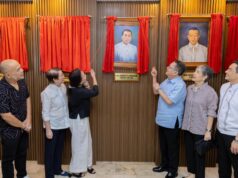CLARK FREEPORT—A component that will boosts Philippine development into a higher middle-income economy was how the Department of Finance (DOF) sees the Comprehensive Tax Reform Program (CTRP).
The DOF also said it will revamp the country’s tax system in to make it “fairer, simpler and more efficient to all” while also raising the resources needed to invest in infrastructure and the people.
Finance assistant secretary Ma. Teresa Habitan said this was the first time that the Philippines has done the program and executed it without any crisis in the economy.
“The Tax Reform Program is looking forward to provide more inputs, more resources for this present generation of Filipinos so that they can achieve their full potential as individuals,” Habitan explained during the Central Luzon stakeholders briefing in the recent Philippine Economic Briefi ng here.
Congress passed last year RA 10963 or Package 1 of the CTRP which simplifies the income tax brackets by decreasing it to only six brackets.
The DOF said effective tax rates will be lowered for 99 percent of taxpayers, except for the richest.
Package 1, also known as the Tax Reform for Acceleration and Inclusion (TRAIN) Law, likewise lowered estate tax from the highest 20 percent rate to a single rate of six percent for net estate with standard deduction of P5 million to simplify the system as well as exemption for the first P10 million for the family home.
“It also lowered donor’s tax from the highest 15 percent to a single rate of six percent of net donations above P250,000 yearly,” Habitan added.
One of the major provisions of the tax reform is the staggered increase in oil excise.
“The current rates have been unadjusted since 1997, draining some P145 billion of government revenues annually. Under TRAIN, rates will be adjusted gradually between 2018 and 2020,” she explained.
As a mitigating measure on oil excise tax, the poorest 10 million households will receive cash transfers of P200 per month in 2018 and P300 per month in 2019 and 2020.
On the other hand, coal excise tax will have a rate increase from P10 per metric ton to P50 per metric ton in 2018, P100 per metric ton in 2019, and P150 per metric ton in 2020 covering both domestic and imported coal. Domestic coal remains VAT exempt.
“TRAIN simplifies the excise tax on automobiles. While the approved rates are considerably lower than originally proposed, it remains that more expensive cars are taxed higher compared to cheaper cars,” Habitan said.
Debunked
However, this was debunked by the advocacy group Action on Economic Reforms (AER) saying that the prices of luxury vehicles were lowered instead.
On the other hand, AER said prices of basic utility cars, which salaried workers and middle-level executives buy, went up.
The DOF said excise Tax on Sugar-Sweetened Beverages (SSB) is a health measure meant to discourage the consumption of sugar-sweetened beverages due to their high-sugar content while encouraging industry players to develop healthier product alternatives.
Covered by SSB are sweetened juice drinks, sweetened tea, all carbonated beverages with added sugar including those with caloric and non-caloric sweeteners, flavored water, energy drinks, sports drinks, other powdered drinks not classified as milk, cereal and other grain beverages, and other non-alcoholic beverages that contain added sugar.
Key exemptions are 3-in-1 coffee, milk and 100 percent natural juice. Excise tax on these drinks is P6 per liter of volume capacity for SSBs using purely caloric and purely non-caloric or a mix of both.
P12 per liter of volume capacity for others using purely high-fructose corn syrup or in combination with any caloric or non-caloric sweeteners.
Package 1 also repealed 54 out of 61 special laws with non-essential VAT exemptions thereby making the VAT system fairer, according to the DOF.




